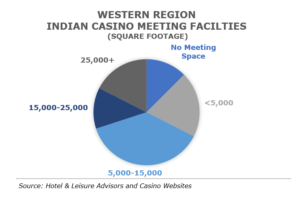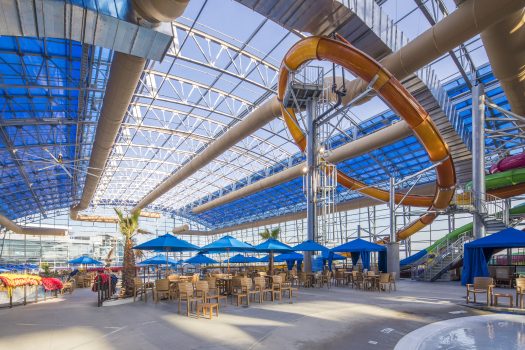As casino resorts prepare to reopen in the era of the coronavirus pandemic, operators are looking at how to best serve the needs of both their customers and team members in this new reality. The world has changed and Indian nations across the country are evaluating best practices, reopening plans, and business strategies to stop the hemorrhaging of cash flows and keep their Indian nations afloat, while providing a much needed source of entertainment for their customers. In the wake of reopening, the number of people allowed to gamble at most facilities will be reduced, as occupancy limits in gaming areas will be reduced. That being said, there are a number of opportunities and business strategies that operators can adopt during this transitional time that may lessen financial hardship and increase awareness of the measures being taken to mitigate the spread of the disease, while building customer and team member trust. With adaptive repurposing of existing space, increased communication, the use of technology, and changing the traditional process flow of casino amenities, operators who provide the most flexibility at their facilities have the greatest likelihood of weathering this storm.
Outdoor Operations
With the decrease in the number of gaming positions, the potential loss in revenue will be commensurate with the reduced capacities on busy days. One potential countermeasure to help mitigate the reduced capacity would be to convert existing outdoor spaces into an extension of the gaming floor. Many gaming establishments in Las Vegas have made use of their outdoor spaces with modest outdoor gaming areas,typically centered around their pool areas. However, it is not just temperate weather locations that are benefiting from this. The recently acquired MGM Northfield Park in Northfield, OH, offers three year-round climate-controlled outdoor gaming patios. The combined 8,000 sq. ft. space offers over 240 video lottery terminals, heaters during the winter, beverage service, and serves a dual-purpose as the casino’s designated smoking area. Across the nation, governors of states have eased restrictions on outdoor activities and the consensus among customers, according to numerous surveys, is that outdoor activities and amenities are more appealing right now than an indoor environment.
A Focus on Health and Safety
For continued indoor operations, the message from gaming facilities going forward should be focused on exemplary sanitation practices. Many casinos already offer advanced air filtration systems for combating smoke. Properties that are looking to upgrade or implement new systems should consider high efficiency particulate air (HEPA) filtration systems with a minimum efficiency reporting value (MERV) of 16 or greater. These filters are often used in places like hospitals, where high levels of unknown airborne bacteria and viruses can spread through the air ducts. In higher-trafficked areas, such as restrooms, beverage stations, and entrances, operators can also consider the addition of ultraviolet (UV) lights, specifically UVC lights with wavelengths between 200 to 280 nanometers. Though there has not been any published research into how UVC affects COVID-19 specifically, studies have shown that it can be used against other coronaviruses, such as severe acute respiratory syndromes (SARS). A less proven concept that has recently emerged is the use of infrared (IR) cameras to detect abnormalities in body temperature. While not a perfect science, the strategic placement of infrared cameras at entrances could be a quick, inexpensive, noninvasive way of surveying large groups of people and flagging individuals who may require follow-up questioning.
In addition to the use of technology, establishments should share their enhanced sanitation procedures with customers and encourage them to help casinos open by self-implementing best practices. With so many touch points in a casino environment, casinos should provide disinfectants to both employees and customers at every opportunity. Cleaning schedules should be increased, and safe and proper hand washing practices should be strongly encouraged to guests and required of team members. The more that best practices can be shared among casino staff and customers, the better off the industry will be as casinos strive to return to some semblance of normalcy.
Non-Gaming Amenities
Another looming question on the minds of operators is what will become of the non-gaming amenities during this transitional period. With social distancing requirements in place, non-gaming amenities such as restaurants, buffets, food courts, nightclubs, concert venues, movie theaters, bars, and others will face an uphill battle in coming back to pre COVID-19 levels. Prior to the pandemic, non-gaming amenities at many Indian gaming facilities exhibited strong growth with year-over-year increases of 8% or greater, with over$4 billion in consumer spending annually. While guidance from the Centers for Disease Control and Prevention (CDC) may limit some of these operations from opening in the near future, operators should be looking at ways to work within the constraints and minimize customer-facing interactions, extending out to hotel operations as well.
More chain-affiliated hotel properties throughout the nation are looking to the use of digital key systems in lieu of typical guest check-ins at the front desk. Indian casino resorts should also take this into consideration for their hotel operations. The use of technology to minimize contact does not stop there. On the casino floor, automated ordering systems for beverages on gaming machines have been pioneered by commercial operators for several years. These systems now serve as a delivery platform as opposed to a manual order taking and delivery process. The benefits of such a system are two-fold, in that it not only reduces interactions, but it also eliminates a step in the process, increasing operational efficiency and reducing wait times for guests.
Additionally, many point-of-sale systems now offer the ability for an online ordering platform to be integrated into existing operations. Customers could potentially order food and beverage ahead of time from the convenience of their phones and pick up orders from establishments throughout the casino. This eliminates line queueing and allows guests to space out throughout casino common areas beyond the confines of the outlet to consume their meals, creating greater social distancing. Other non-gaming amenities that are faring well during the pandemic are golf courses and RV Parks. With limited options for recreational activities among wide-spread closures of many indoor recreational facilities, many golf courses have seen large increases in rounds played compared to the same period last year. According to GolfNow, a popular online booking platform for golf courses, the number of rounds sold online at public courses that remained open throughout the COVID-19 pandemic were up 60% year-over-year. Recreational vehicle (RV) sales in some areas of the country have experienced upward of 170% growth over the same period last year, according to the RV Industry Association.
The Fate of Meetings
Meeting space within casino resorts will likely be the last non-gaming amenity to bounce back, with many states still limiting the size of gatherings, corporations looking to control costs, and a rise in popularity of video conferencing. The meeting landscape is likely to look different for years to come with hybrid meetings becoming a popular trend. At Indian casinos, the general trend is that the larger the casino (number of gaming positions), the greater the amount of total meeting space. The following table presents the average meeting space of Indian casino resorts in the western U.S. region.

Most casino resorts offer some meeting space that is likely to remain underutilized. With a decrease in the number of positions allowed on the gaming floor by social distancing requirements, casino resorts should consider temporarily converting a portion of their meeting space to gaming space to maintain more gaming positions. The meeting space can be returned for groups as demand increases.
Conclusion
While it is likely to be a slow road ahead, there is no reason for Indian casino resorts to lose hope. Indian casino resorts and their affiliated amenities will see a decline in revenue and usage in the immediate future. However, properties can still benefit during this time from the adaptation of existing amenities or in some cases, amenity additions. Casinos need to look for opportunities to maximize what is currently working in this new reality. For example, many golf courses are seeing an increase in rounds and RV sales are also on the rise.
Indian casino resorts can consider adding amenities that may play to their strengths. Another key component is staying in contact with customers to determine what they are most comfortable with and how casinos might be able to target those customers looking to make use of allowed and (least likely to be affected) amenities.
The success of making it through the COVID-19 pandemic will depend on individual operators being nimble and willing to embrace the tumultuous changes. Those that can be more proactive instead of waiting for the crisis to end, stand a better chance of not only surviving, but thriving in 2021 and beyond. Making adaptations now will make transitions over time to more normal operations easier and, hopefully, more profitable. The challenge casinos will face, beyond government restrictions, will be customer safety and acceptance of new guidelines and operations. Customers want to feel safe, but also still feel entertained for their troubles. Striking the balance between safety and entertainment is a key component to future success.
This article was originally published by Indian Gaming Magazine.
Author
Stephen Szczygiel, CHIA, is an Associate at Hotel & Leisure Advisors (H&LA), a national hospitality consulting firm. H&LA specializes in appraisals, feasibility studies, impact analyses, economic impact studies, and litigation support for hotels, resorts, waterparks, attractions, casinos, conference and convention centers, golf courses, ski resorts and other leisure real estate. H&LA has performed work for over 20 Native American and First Nations over the past ten years. Stephen prepares appraisals, market feasibility studies, economic impact studies, and impact studies throughout the United States. Prior to joining Hotel & Leisure Advisors, Stephen was Director of Food & Beverage with several Hilton branded properties, Assistant General Manager for XfinityLive!, and spent many years in the casino industry as Manager of Food & Beverage for Hollywood Casino at Penn National Racecourse. Stephen earned his Bachelor of Science in Hotel and Restaurant Management, with a focus on Casino Operations, and Minor in Business Administration from Drexel University in addition to studying Culinary Arts at The Restaurant School at Walnut Hill College in Philadelphia. He can be reached via telephone at 216-810-5801 or via e-mail at sszczygiel@hladvisors.com.


